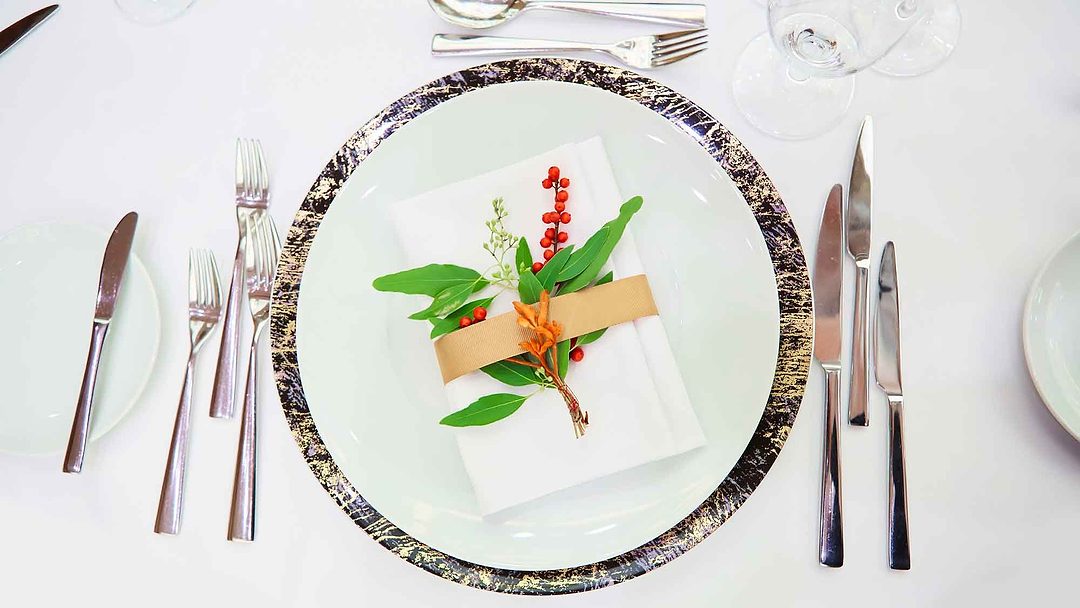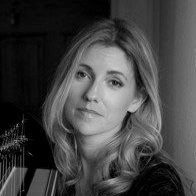
QUESTIONS
Questions 1 – 4: Imagine you live in Victorian era Concord and the holidays are here. It’s time to party like a Victorian, which means you shouldn’t look like you’re having too good of a time because that is considered rude. A moderate level of “good timey-ness” will suffice. Rose Hawthorne Lathrop (the daughter of Nathaniel Hawthorne) has invited you to Christmas dinner at The Wayside, the house where she grew up and that she and her husband later purchased in 1879. Use the following questions to judge or brush up on your readiness to attend a Victorian holiday dinner party.
1. Rose has invited everyone to sit down at the table for dinner. There is a plethora of silverware neatly arranged around your dinner plates, each with a particular use for a specific food. You suddenly can’t remember what each is for, but as a rule of thumb (or eating), you know you should usually:
a)
Begin with the outermost silverware and work your way in with each course
b)
Start with the silverware closest to
your plate
c) Use the “universal spoon” for everything
d)
Forget it! Just use your hands. You’re not great friends with Rose and her husband George and wouldn’t mind not being invited back.
Click to show the answer
Answer: A. Begin with the outermost silverware and work your way in with each course. Memory tip: When in doubt where to begin, work it out to in. Like an ice cream sundae topped with a cherry, save the silverware above the plate for dessert.
a) Begin with the outermost silverware and work your way in with each course
b) Start with the silverware closest to your plate
c) Use the “universal spoon” for everything
d) Forget it! Just use your hands. You’re not great friends with Rose and her husband George and wouldn’t mind not being invited back.
2. Dinner rolls are being passed around the table. The platter reaches you with only one roll left on it. To be polite, you should:
a) Take it
b) Leave it for someone else
Click to show the answer
a) Take it
b) Leave it for someone else
Answer: A. Take it. As described in the 1847 guidebook, Etiquette for Gentlemen, “Avoid…that most vulgar habit which prevails among half-bred country people, of abstaining from taking the last piece on a dish. It amounts almost to an insult toward your host, to do anything which shows that you fear that the vacancy cannot be supplied and that there is likely to be a scarcity.”
3. The main course of mallard duck, sweet potato croquettes, and minced cabbage is the most delicious meal you’ve ever eaten, and you’re still hungry. To be polite, you should:
a)
Snap your fingers at the servants to indicate you’d like seconds but not interrupt verbal conversations around you
b)
Don’t finish your meal; leave some on the plate
c)
Clean your plate to express appreciation for the delightful meal
d)
Ask the person next to you if they are going to finish theirs
Click to show the answer
a) Snap your fingers at the servants to indicate you’d like seconds but not interrupt verbal conversations around you
b) Don’t finish your meal; leave some on the plate
c) Clean your plate to express appreciation for the delightful meal
d) Ask the person next to you if they are going to finish theirs
Answer: B. Don’t finish your meal; leave some on the plate. Clearing your plate would be rude and signal to your host that they had not provided enough to you. And, heaven forbid, don’t ask for seconds, yell, snap at the staff, or- gasp- eat off another’s plate! You’re a proper Victorian!
4. It’s your turn to host a dinner party. The year is 1879, and your cook has suddenly left to attend a meeting at Louisa May Alcott’s house as Louisa promotes the crazy idea of women having the right to vote. Luckily, your cook has spent the past week preparing a “neets feet pie.” And who doesn’t love a neets feet pie, the main ingredient of which is:
a) Broccoli stems
b) Two-foot-long rolled pastry
c) Cow or oxen feet
d) Frog legs
Click to show the answer
a) Broccoli stems
b) Two-foot-long rolled pastry
c) Cow or oxen feet
d) Frog legs
Answer: C. Cow or oxen feet
5. In the winter months of the 1840s, what improbable product was exported from Concord, Massachusetts, around the world?
a) Samuel Adams beer
b)
Authentic colonial musket balls uncovered from the Concord fight of
April 19, 1775
c) Ice from Walden Pond
d)
Beans from Henry David Thoreau’s unexpectedly large bean field
Click to show the answer
a) Samuel Adams beer
b) Authentic colonial musket balls uncovered from the Concord fight of April 19, 1775
c) Ice from Walden Pond
d) Beans from Henry David Thoreau’s unexpectedly large bean field
Answer: C. Ice from Walden Pond. The ice trade from Concord was started by Bostonian Frederic Tudor, who was nicknamed “the Ice King.” Read about the Ice King and Concord’s ice trade in “The Old Hag, the Ice King, and the Artichoke” in this issue of Discover Concord.
6. Born in 1915, beloved and famed children’s illustrator Tasha Tudor lived in Vermont and visited Concord, MA. Which of the below facts about Tasha Tudor is/are true?
a) She was the granddaughter of Massachusetts’ famous “Ice King” Frederic Tudor
b) Her real name was Starling Burgess
c) She occasionally carried a pet chicken in her skirt
d) She illustrated an edition of Louisa May Alcott’s Little Women
e) All the above
Click to show the answer
a) She was the granddaughter of Massachusetts’ famous “Ice King” Frederic Tudor
b) Her real name was Starling Burgess
c) She occasionally carried a pet chicken in her skirt
d) She illustrated an edition of Louisa May Alcott’s Little Women
e) All the above
Answer: E. All the above! The granddaughter of Massachusetts’ “Ice King” Frederic Tudor, Tasha Tudor was originally named after her father, Starling Burgess. She changed her name when she became a writer and illustrator. Fond of animals, Tasha rescued a chicken called Chickahominy which she sometimes carried tucked up in her skirt wherever she went. In 1969, she illustrated an edition of Louisa May Alcott’s Little Women, published by William Collins.
7. In the opening line of Louisa May Alcott’s Little Women, Jo grumbles, “Christmas won’t be Christmas without any…” what?
Click to show the answer
Answer: Presents
8. In 1816, Concord and other Massachusetts residents experienced what unusual event?
a) Summer never arrived
b) It was hot all year
c) The Regulars came out, again, trying to re-do, and this time win, the Battle of Concord
d) A cicada infestation
Click to show the answer
a) Summer never arrived
b) It was hot all year
c) The Regulars came out, again, trying to re-do, and this time win, the Battle of Concord
d) A cicada infestation
Answer: A. Summer never arrived. A dangerous and deadly winter settled on Massachusetts for an entire year. Read about it in Richard Smith’s article, “Eighteen Hundred and Froze to Death; the Year Without a Summer,” in this issue of Discover Concord.
9. Where to go? You are visiting Concord in the winter of 1842 and wish to bring a Christmas gift to newlyweds Nathaniel and Sophia Hawthorne, who are renting a house in Concord. You are unsure of their address, but several locals tell you to “go to the Emersons’ old home.” Do they mean:
a) Ralph Waldo Emerson’s House on Cambridge Turnpike
b) The Wayside on Lexington Road
c) The Old Manse on Monument Street
d) The Meeting House on the Green that has been converted into posh condos
Click to show the answer
a) Ralph Waldo Emerson’s House on Cambridge Turnpike
b) The Wayside on Lexington Road
c) The Old Manse on Monument Street
d) The Meeting House on the Green that has been converted into posh condos
Answer: C. The Old Manse on Monument Street. The Old Manse was built in the 1700s for Ralph Waldo Emerson’s grandfather, William Emerson. The Hawthornes rented the home from 1842-1845 before moving to Salem, MA. They returned to Concord and purchased The Wayside in 1852. The Old Manse and The Wayside are now museums full of wonderful history and tour guides. Visit The Old Manse at 269 Monument Street and The Wayside at 455 Lexington Road, Concord, MA.
10. In his essay “Wild Apples,” Henry David Thoreau wrote about an old English custom practiced on New Year’s Eve when groups of boys would gather in apple orchards, encircle the apple trees, and repeat a chant encouraging the trees to grow strong through the winter. What was the name of this custom?
a) Bough-lifting
b) Apple-howling
c) Ritual Rootimus Profundus
d) Muggle-incanting
Click to show the answer
a) Bough-lifting
b) Apple-howling
c) Ritual Rootimus Profundus
d) Muggle-incanting
Answer: B. Apple-howling. Standing in circles around the apple trees, the boys would chant, “Stand fast, root! Bear well, top! Pray God send us a good howling crop: Every twig, apples big; Every bough, apples now!”
Contact Barrow Bookstore for a list of sources. Barrowbookstore@gmail.com.
————————————————————————
For more than 50 years, Barrow Bookstore has been a favorite of residents and visitors alike, specializing in Concord authors and history, children’s books and literature. The shop also provides a wide array of gently read and rare titles ranging from paperbacks to first editions and original manuscripts. Staff members have all worked as tour guides and reenactors in Concord and are happy to share their knowledge about the town and its history. Discover more at barrowbookstore.com.


